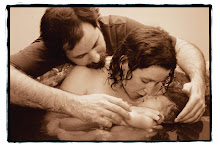
You're more likely to have your first baby at around 41 weeks (and a day, to be precise). But almost everyone thinks they will be early. Obviously some of them will be, and about 5% will be right on time and many are "late". But the whole idea of estimated due dates gets shortened to DUE DATE...but it's an estimate. I'm pretty sure our moms were not stressed about their EDD in the same way that current birthing moms are. But then inductions didn't loom so large even 10 years ago.
One thing I've noticed (perhaps I've said this before?) is that women who had some concerns over pre-term labor pr were put on bed rest or similar usually see their "due date" come and go. I think our minds and our connections to our babies are powerful - we tell them, "don't come baby" and they listen! So if you are waiting on your baby, have a talk with them.
Also, what was your cycle like when you got pregnant? If it was longer, eg. 33 days, then your date might be off - that dial-a-baby is based on 28 days, getting pregnant on day 14. Same deal for shorter cycles - maybe you're a little more pregnant than your date indicates and you'll be "early".
Either way, no one has been pregnant for ever - your baby will come.













3 comments:
Hello
Both babies listened to me: the first waited two weeks since I'd worked up to nearly a week before the due date and her actual due date was a snowstorm. I relished those two weeks. The day she was born was the day I'd planned to dip into the castor oil.
The second held off a week so my husband could get appliances in our renovated kitchen in and working.
This convinced me on this phenomenon. Thanks for pointing this out.
I really prefer the idea of a "due month", since babies come early, late, but rarely on their "due date"!
Post a Comment